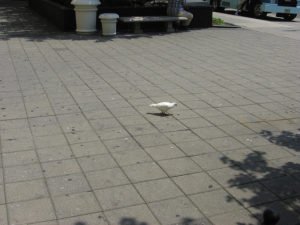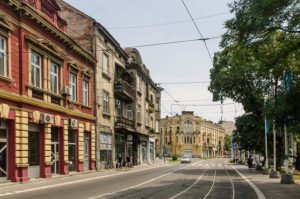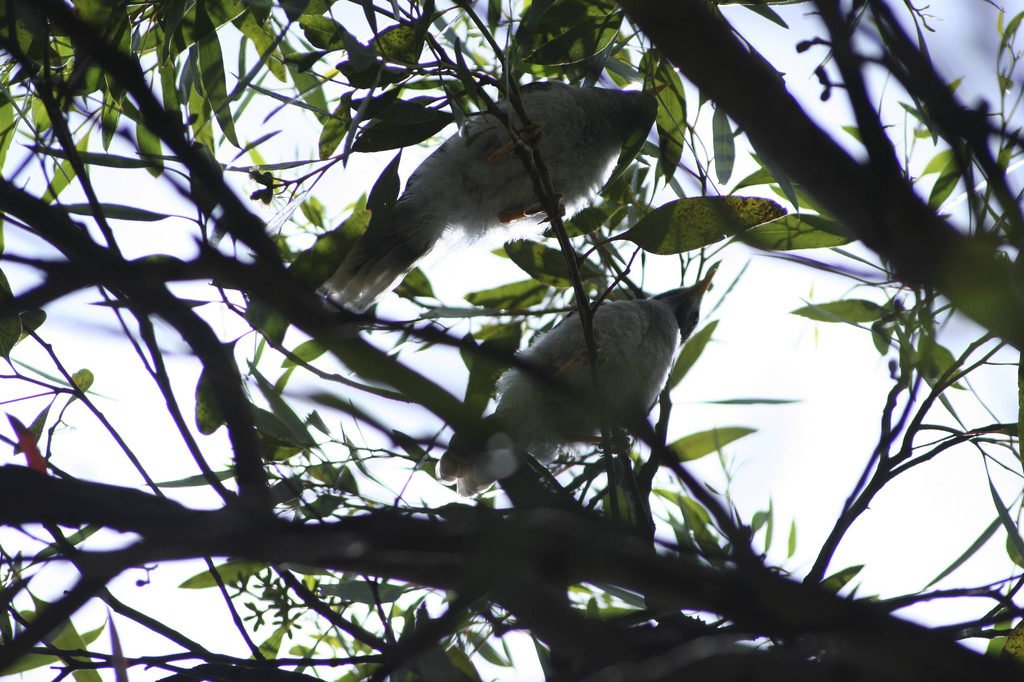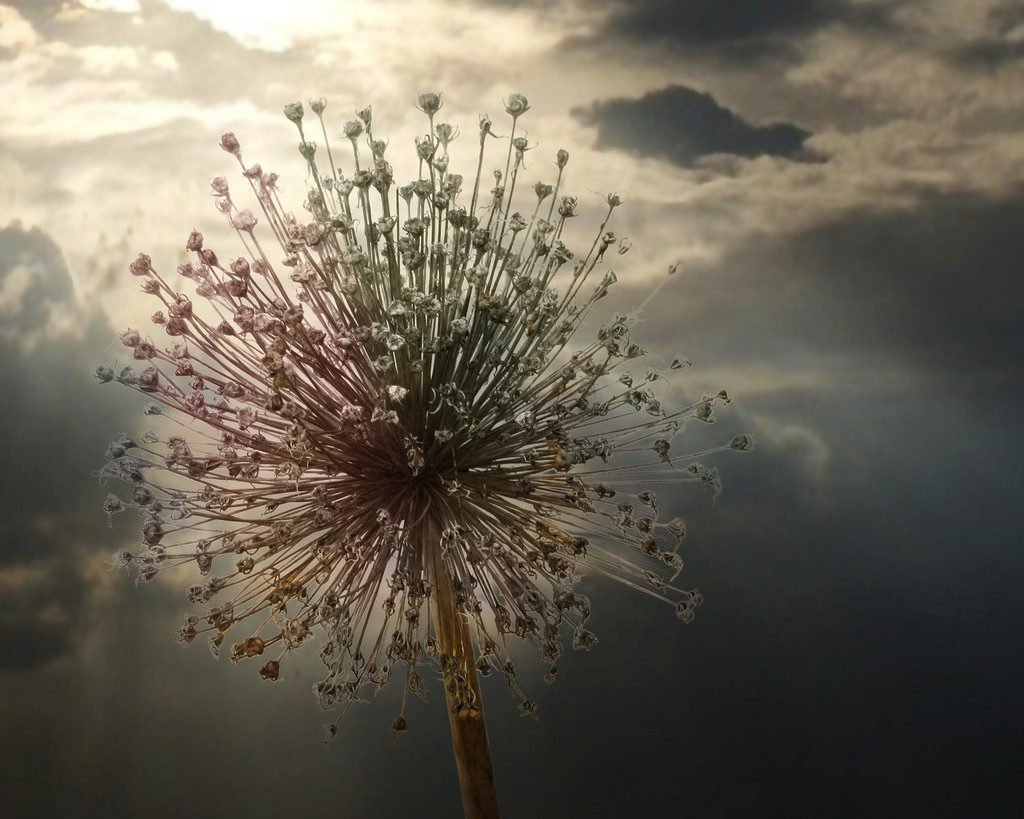A white pigeon sat in the gutter, waiting. Her wings were folded up like sails of a ship at anchor, her head bobbing in a sea of cobblestones. Slobodanka stopped, crouched down and peered into the bird’s brown almost red eyes. They blinked at each other. She reached out her hand slowly towards the bird, expecting it to fly away, but it didn’t move. The pigeon was like silk, smooth and shiny, her body firm and substantial under the girl’s fingers, weighted with warmth.

She set her books down, looked up and down the street, then gently wrapped her fingers around the pigeon’s body. The feathers on the bird’s belly were hard and crusted over, and the girl felt the sticky heat of blood on her fingers. As she lifted it up, the pigeon’s left foot peeled motionlessly up off the road, hanging limp, but the right foot began clawing for traction, catching on Slobodanka’s hands. The girl jerked away, startled, and let the pigeon go, but the bird didn’t get far, flapping wildly before collapsing onto the street again. She looked down at the blood on her hands, then rubbed them together to wipe it away. She adjusted her uniform, picked up her books, and started running.
She ran past Vojvode Bogdana Street and the tin-roofed houses on either side, white-washed in stucco, then past Zahumska Street and the new apartment building for rich people, filled with indoor bathtubs and heated radiators. She crossed the street and past the shoemaker, čika Boža, smiling under his handlebar mustache inside the doorframe to his shop, then unlatched the wooden gate and burst into the courtyard.
“Mama!”
There were seven small buildings radiating out from the tree in the center of the courtyard, each room walled in plaster and roofed with loose-stepped tiles that were missing in places. She went straight to the one at the far end, back by the red brick wall, and peered into the kitchen. The big black dragon of a stove sat coiled in the corner, asleep. It was cold.
“Mama?”
She turned around, closed the kitchen door, then walked across the courtyard to the other side, checking the bathroom first, then the pantry, before pushing into the far building. The bed she shared with her sister was empty too. When she stepped back out into the courtyard čika Boža was waiting for her.
“What’s wrong? Why are you running?”
“I’m looking for my mom. Do you know where she is?”
“She’s at the piazza.”
She set her books down on the brick paving and looked back up at him.
“I have to go.”
She went back out the wooden gate, then turned south toward the double lane expanse of Revolucije Boulevard, the main artery of Belgrade that pushed cells of people through the veins of the city in cars and trams and trolleybuses and the occasional horse and carriage.

As she waited for a break in the traffic, she thought about the pigeon. It was dying, and there wasn’t much time. She’d been afraid to tell čika Boža about the bird after what had happened to the kitten. It hadn’t been his fault, but he had been the one who’d hired him. While the other men were out front stuccoing the front of the shop, the contractor had come into the courtyard to fix the interior walls and had put his tools right next to the mother cat and her babies. Then he’d stepped on the grey kitten, crushing his skull, the soft bones collapsing under his black work boots.
Her mother had cursed him, forcing him back outside and shaming him into apologizing, but Slobodanka had heard him laughing and she knew that he’d done it on purpose. She stepped over the tram rails and crossed onto Sinđelićeva Street. That’s where they’d thrown away the body of the dead kitten, into the yawning mouth of the metal monster. She averted her eyes from the dumpster and started running again.
Kalenić Piazza was a sprawling open-air market set into a triangle along Maxim Gorky Street. Slobodanka could smell the stink of fish before she saw the rows of rusted metal booths, each one covered in wavy sheets of variously colored plastic like a rainbow ocean of waves. It was past noon and most of the farmers had already packed up—the tables left empty, the ground scattered with discarded wooden packing boxes—and the few farmers that were left were selling what they had for cheap so they wouldn’t have to throw it away.
Slobodanka ran along the outside row of booths and scanned down the aisles. Her mother was walking towards her with a green mesh bag of vegetables in each hand, and when she saw her daughter she smiled.
“Ciao! What are you doing here?”
Slobodanka took one of the bags from her and started walking ahead.
“I need your help, Mama, you have to hurry.”
Cveta hurried behind her.
“Wait, what’s happened?”
“It’s a bird.”
“A bird?”
“A pigeon. She’s on the street, she’s dying. We have to help her.”
Her mother had always been the one protecting animals, feeding the stray cats that jumped up onto their back wall from the neighboring plot. That was where the vulkanizer stored the rubber he needed for making tires, and the cats prowled the yard for territory and fought each other in long midnight duels. She even let them into the courtyard with their kittens. Slobodanka didn’t want to think about the kittens.
“Why are you still in your uniform?”
Slobodanka looked down at the dress. “I didn’t get a chance to change.”
“Look at your shoes, what did you do?”
She had been running in her leather dress shoes, the ones the city had given her for school, and she had scuffed them and torn the strap that ran across the bridge of her foot.
“You should have changed,” her mother said. “They’re ruined.”
“Čika Boža will fix them mama. Don’t worry.”
“That’s not the point. There isn’t another pair of shoes where those came from. Think.”
“I’m sorry,” she said, “I’m sorry.”
And she was for a second, when she saw her mother’s mood change, but then she thought again about the pigeon and the bird’s sides heaving up and down and the sticky blood that it seemed so unimportant to get upset over shoes.
“Mama, the pigeon’s dying. We need to go.”
Cveta handed Slobodanka the other bag of groceries, went to an empty food stall and picked up one of the wooden packing boxes a farmer had left behind. Then she waved her on and they hurried back home.
The pigeon was in the same place the girl had dropped her earlier. Slobodanka could just make out the white feathers in the distance, a gleaming shell on a beach full of rocks. Her mother went up to the injured bird and quickly placed her hand over the wings so she couldn’t fly away, then scooped her up into the wooden box and covered it with a sheet of newspaper that had been lining the inside. Slobodanka could hear the bird clawing at the wood, her wings flapping uselessly trying to get away, but Cveta held her arm over it until the bird calmed down and went quiet. She put the box under her arm and started down the street. Slobodanka followed behind her.
“Where are we going?”
“To see teta Iva.”
Iva’s house was down Zahumska Street behind a tall, slatted wooden fence that looked just like theirs. She could make out the roofs of buildings on either side of her just like at home, but where Slobodanka’s house backed out onto the rubber yard, Iva’s adjoined a vast courtyard dotted with dozens of buildings that stretched the length of the block all the way to Vojvode Bogdana Street. There were more than 25 families living back there, but Iva’s house was separated from them and had its own entrance because she was the gazda, the boss.
When Cveta rapped at the gate Slobodanka became nervous. She had never been behind Iva’s gate. Some of her classmates who lived there had told her stories about the childless woman who lived alone and yelled at the kids when they were playing. If their ball went over the fence, their parents told them to leave it alone.
“Well, hello,” Iva said when she opened the gate and saw the box Cveta was carrying. “What do we have there?”
“I hope you can help us,” her mother said. “We have a pigeon.”

Iva opened the gate and led them inside, and there, in the center of the courtyard, where there was usually a tree like the one growing at Slobodanka’s house, was a giant aviary filled with pigeons. Cveta and Iva took the box with the injured bird into one of the buildings to the right, but the girl stayed behind in the courtyard to get a closer look at the pigeons. They were living in a huge cube framed in old grey wood, stained with time and covered in chicken wire, and filled inside with rows of perches. The birds wore tiny metal bracelets on their ankles and were beautifully patterned in all shades of brown and grey and white with identical cowlick tufts that sat upright at the back of their heads. One pigeon had a black cloak of feathers that only covered its back and neck, while the rest of its body looked naked in white. There was one pigeon with a brown mask over his face and nowhere else; another was the color of the birds Slobodanka saw out on the streets but had a white bib around its neck. There were pure white birds, and purely brown birds and a mixture of everything, and they sat quietly next to each other, some with their feet invisibly tucked underneath so they gave the impression of floating.
She pushed her fingers through the mesh and the birds closest to her turned their heads to look at her, but didn’t move. Others ignored her and continued to preen, lifting their wings and pushing their beaks underneath, tidying their feathers. One pigeon stretched out its right leg and wing, balancing on one foot, its neck pushed forward as if about to say something, then ruffled its feathers and settled back down onto the perch.
Except for the injured pigeon she had found that day, Slobodanka had never been so close to a bird before. She stood transfixed, peering in close enough to see each individual feather: the tiny almost invisible ones radiating out around their cheeks, the fluffy ones around the neck with finely toothed edges reflecting the light, the long, rounded ones on the wings tapering out to a fine point, and at the end the tail feathers, the only ones that looked like a feather should, with a hard rib down the middle like a leaf, with branches growing out of it on either side.
Pigeons had always been there, all her life—as much a part of the landscape as the cobblestones in front of their house on Cirile i Metodije Street or the chestnut trees in Vukov Park—but she felt as if she were seeing them for the first time. They were like people—like her—individuals who got an itch and scratched it, who felt cramped and stretched out, who got hurt on the street, and suffered. They were making decisions of when to eat and where to go, and it surprised her that she had never thought of them doing that because now, standing so close to them, it seemed so obvious.
Slobodanka thought of her injured pigeon with its white feathers and red blood and turned back to the house. I hope she’s alright.
The girl slowly pushed open the door into the building her mother had gone into. There were so many things, everywhere. The walls were completely covered in framed paintings of distant green places, each one snugged up against another so that you couldn’t see the plaster underneath. There was a red rug on the floor, bordered in blue diamond patterns, but it was weighed down with small tables and standing lamps and a sofa, of all things, plush and soft and draped in flowers.
She had never been inside a room like that, ever. Slobodanka’s house didn’t have anything on the walls except for a few framed pictures of her parents’ wedding day and portraits of her grandparents out on the farm in Macedonia. She’d never had a sofa because she didn’t have a living room. Where had Iva gotten all these things, she wondered, peering at the paintings, and why? She carefully opened one of the drawers next to the sofa. It was filled with old antique scissors engraved with initials and round glass paperweights with floating flowers inside them. Who came here to use these things, and sit on this sofa, and walk on a rug more beautiful than a dress? It all seemed so extravagant—and although she was mesmerized by the patterns and the colors, she felt boxed in and claustrophobic in this room filled with so many unnecessary things and missing the most basic ones. Maybe, Slobodanka thought, Iva had put these paintings up because she didn’t have any family. She felt sorry for her.

She walked through the room and under an archway that led her into a study lined with glass-fronted cabinets filled with books. It was dark inside because the window backed out onto the rear of her property, and the fence had been built too close to it so no light could get through. An electric lamp was lit on a desk on the far wall, and Iva and Cveta stood in its yellow halo holding her injured pigeon.
The pigeon was on her back and surrounded by the silky white feathers Iva had plucked away from the wound on her belly. The red scar cut across her body revealing pink muscles tinged in blue, quivering and bloodless. Iva wiped the wound with a cotton ball dipped in a purplish bath, and then opened a jar of honey she had on the desk next to her. She smeared a thick glob of it over the wound, golden and glistening.
“Honey?” Slobodanka said. “Why are you putting that on her?”
“It antibacterial,” Iva said, “it will help protect against infection.”
Slobodanka watched as Iva placed thick squares of gauze over the wound as Cveta held the bird upright and wrapped a long piece of fabric around her body to keep them in place, lifting one wing at a time, until the pigeon’s torso was hidden beneath her new vest. We never would have been able to do this without her, Slobodanka thought, and she felt a rush of gratitude for the woman who had helped her bird.
“Just wait here,” Iva said. “I’ll be right back.” She moved towards the door, but Slobodanka called out to her.
“But wait, will she be alright?”
“I don’t know.”
Iva came back with a hot water bottle that she placed at the bottom of the vegetable box, then laid sheets of newspaper on top of it and put the pigeon inside. She put two bowls in front of the bird, one with seed and one with water, and covered the box with a blanket.
“Now we wait.”
“Wait for what?” Slobodanka said.
“To see if the bird makes it.”
“That’s it? There’s nothing else we can do?”
“Not yet,” Iva replied. “It’s in shock—it’s not stable. If it makes it through the night I’ll set that leg and the wing.”
“They’re both broken?” Cveta asked. “How does that happen?”
“They get hit by cars.”
Slobodanka leaned down next to the box and peered inside. In the warm darkness she could see the pigeon extend her neck, dip her beak into the bowl and gulp down the water, her throat expanding and contracting with each swallow, the brown almost red eye blinking. The pigeon shook her head, water flicking off her beak, and closed her eyes. The girl had hoped that rescuing the pigeon would make her feel better, would let her stand on a solid line between life and death and stop the bird from going over. But she didn’t feel better—she felt helpless. The pigeon looked even smaller and more vulnerable inside the box, as if the marker between living and dying had become softer, blurred somehow, so it would be easier to cross over without even noticing. Slobodanka wasn’t barring entry—she was off in the distance, looking through a telescope, watching things unfold without being able to do anything to stop them.

Share this post with your friends.


People ask what is the purpose of life? It is to live our life discovering something brand new every day, like the fact that everything and everybody deserves love.